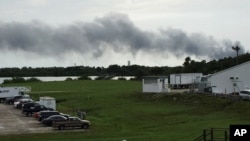A satellite destroyed when an unmanned SpaceX rocket blew up on a Florida launchpad Thursday was intended to beam high-speed internet signals to Africa for Facebook.
No one was hurt when a series of explosions shook the launch site at Cape Canaveral. People working in buildings several kilometers away felt the force of the blasts, which occurred as the rocket was undergoing routine preflight tests before its scheduled launch on Saturday.
The Falcon 9 rocket was consumed by a huge fireball, and a column of thick, black smoke rose from the launchpad. The Israeli-built satellite tumbled to the ground as the rocket blew up, but it also was destroyed.
The loss of the rocket was a big setback for the private U.S. company SpaceX and its partners, including the Israeli Space Agency, which said it could take up to three years to build a replacement satellite.
Facebook founder Mark Zuckerberg, who was in Africa on Thursday, said he was deeply disappointed by loss of the satellite, which was intended to expand internet service to sub-Saharan Africa and other remote parts of the world.
"Our satellite ... would have provided connectivity to so many entrepreneurs and everyone else across the continent," Zuckerberg said.
SpaceX said only that "an anomaly" caused the explosions. The company's South African-born founder, entrepreneur Elon Musk, said the rocket was being filled with propellant when problems with the upper-stage liquid-oxygen tank resulted in the massive blasts.
Isaac Ben-Israel, head of the Israeli Space Agency, told reporters that destruction of the Amos-6 satellite was a “very severe blow” for his country's state-run aerospace industry.
SpaceX pioneered reusable space vehicles that NASA and other space agencies hope to use to reduce the cost of delivering supplies and equipment to Earth orbit for the International Space Station.
